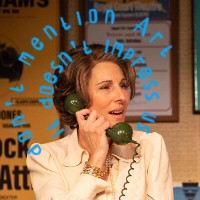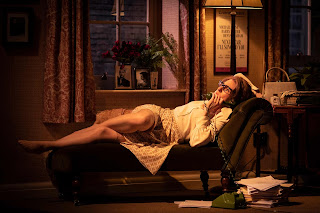 As we go into 2022 Hampstead Theatre finally gets to finish its 2020 season reviving notable works that premiered there over its first six decades. After the bleakness of the last offering we get something lighter in Peggy For You, Alan Plater's affectionate - but not uncritical - tribute to legendary agent Peggy Ramsay. She was the top name for representing playwrights, but despite her fearsome reputation she would have seen any success her clients achieved as largely incidental; and over the course of the day we meet three clients at very different stages of their careers. But first we meet Peggy (Tamsin Greig) crashing on the sofa of her office, having spent the night bailing out one of her most illustrious clients after he ran amok at the French Embassy. Arriving far too early for his appointment is Simon (Josh Finan,) a young writer who sent her a script.
As we go into 2022 Hampstead Theatre finally gets to finish its 2020 season reviving notable works that premiered there over its first six decades. After the bleakness of the last offering we get something lighter in Peggy For You, Alan Plater's affectionate - but not uncritical - tribute to legendary agent Peggy Ramsay. She was the top name for representing playwrights, but despite her fearsome reputation she would have seen any success her clients achieved as largely incidental; and over the course of the day we meet three clients at very different stages of their careers. But first we meet Peggy (Tamsin Greig) crashing on the sofa of her office, having spent the night bailing out one of her most illustrious clients after he ran amok at the French Embassy. Arriving far too early for his appointment is Simon (Josh Finan,) a young writer who sent her a script.If he's expecting praise for his first play he finds it faint - she sees promise in him but has a lot of notes, not many of them entirely coherent. When she tells him what he's written isn't really a play he responds "what is a play?" and she's genuinely tickled by a question that seldom if ever troubles her attic office.
As Simon takes her advice to immerse himself in the work of her favourite playwrights, her second visitor is Philip (Jos Vantyler,) not her most critically lauded writer but, at the moment, by far her most financially successful one; he's here to take her out to lunch to celebrate his engagement. She's both surprised to discover he's straight, and irritated that he's getting married - she prefers her writers single and troubled for the sake of their output. (The fact that all the writers we see or hear about are men, and she considers wives mainly there to be cheated on, means we can't argue with Ramsay's claim not to be any kind of feminist.) Her final visitor is tired of hearing this advice: Henry (Trevor Fox) is happily married but unhappy with his agent. Long past the peak of his popularity, Peggy's failure to secure revivals of his work means he's not making any money, and her chaotic charm no longer works on him.
Completing the cast is Danusia Samal as receptionist Tessa (not her real name, but it takes Peggy about a year to get anyone's name right,) providing a more human face to the company. With Greig in the lead and given a force of nature to play, Richard Wilson's production was always likely to be watchable, and so it proves. It's a loving tribute to the theatre of the 1960s, and James Cotterill's design is cluttered with detail - read and unread playscripts on every surface, and posters from hit productions covering the walls (I did wonder if they were real or jokes - Sugar in the Morning sounds like an absolute pastiche of a Royal Court play title of the time but no, of course it was real.)
Ramsay comes across as passionate about plays and the theatre, if not necessarily the people who make them, and the first act is full of laugh-out-loud one-liners. It can tend a bit towards the arch in the way it's a play about plays - Greig even breaks the fourth wall when Peggy says plays about real people should never be literally true - but for the most part it works. If there's a suspicion, though, that there's not a lot under the witty lines, it's confirmed as the second act does a rather abrupt tonal shift to look at who Ramsay really is, how much the eccentricity and scattiness are an act to help her steamroller over anyone else's opinion, and whether there's an almost sociopathic coldness to the way she values the plays over the people writing them. Wilson's production never quite gets the shift to make sense - it almost goes from hagiography to character assassination, and the play's darker turn doesn't feel earned.
And for a play about someone who championed new and experimental forms of theatre, it's ironically very old-fashioned. I was surprised to find out it premiered in 1999 - watching it I would have guessed early eighties at the latest (who knows, maybe that is when Plater write it, and waited until after the real Peggy Ramsay was dead before making it public?) And while I suppose it technically does follow its characters' own advice of taking the audience across a bridge from one place to another, with the destination appearing foggy at first, I wouldn't say it does so in a particularly dramatically satisfying way. Greig and the rest of the cast make the evening pass enjoyably, but they can't really convince us that the play itself is one of the greats.
Peggy For You by Alan Plater is booking until the 29th of January at Hampstead Theatre.
Running time: 2 hours 30 minutes including interval.
Photo credit: Helen Maybanks.




No comments:
Post a Comment